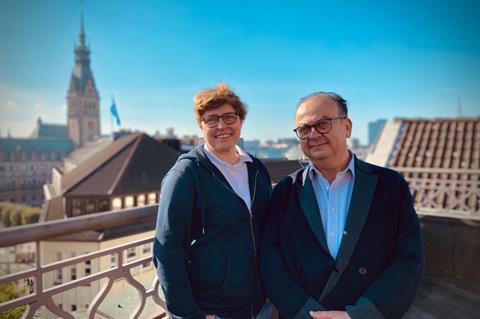
The 31st Filmfest Hamburg opens today (September 28) with Jordanian filmmaker Amjad Al Rasheed’s Inshallah A Boy and will close on October 7 with Mika Gustafson’s Paradise Is Burning.
The festival’s accompanying Industry Days from October 2-6 will address issues such as the promotion of young talents in German cinema, diversity and intersectionality, and green producing before rounding off with the fourth edition of the Explorer Conference on October 6.
Festival director Albert Wiederspiel and director of programming Kathrin Kohlstedde talk about preparing their final edition of the Filmfest together before Wiederspiel hands over to his successor Malika Rabahallah.
What are the characteristics - thematically and aesthetically - of this year’s Filmfest line-up?
Albert Wiederspiel: Family structures and new kinds of relationships are at the centre of many films we are showing. Our opening film Inshallah A Boy is about a very old patriarchal family structure in Jordan and the closing film Paradise Is Burning focuses on three girls in Sweden totally alone and abandoned by their father and mother, while the Palme d’Or winner Anatomy of a Fall is about a couple and their child in a rather toxic relationship.
Kathrin Kohlstedde: Many of the filmmakers we have invited have a very strong and unmistakable film language and style. Examples of this would be Yorgos Lanthimos with his Golden Lion-winner Poor Things and Sofia Coppola’s Priscilla and Alice Rohrwacher and Bertrand Bonello, the two directors being featured in this year’s Contemporary Cinema in Focus section.
AW: And every film is more than two hours! Could the filmmakers please go back to the classic 90 minutes running time! Of course, some films need this length and sometimes it is part of a filmmaker’s aesthetic like in the case of Nuri Bilge Ceylan. I think that it has something to do with digitalisation and the fact that you don’t have to change the can of film during filming. And so many people are now shooting series and they are able to develop a story over a longer period of running time.
KK: One good example of this is Xavier Dolan’s five-part series The Night Logan Woke Up which we deliberately put into our cinema programme rather than into a section on TV series. In fact, Hamburg will be the first festival in the world to show the entire series.
Do political films have a place at Filmfest Hamburg?
AW: Yes, we like to pose questions about the world which is something that art can do. This is particularly the case with the opening film as its sheds light on the terrible position of women in the Middle East. Political films are also gathered specifically in the Veto sidebar, but they are in other parts of the programme as well.
Why did you decide to choose Alice Rohrwacher and Bertrand Bonello for this year’s Contemporary Cinema in Focus?
KK: We introduced this section in 2019 to cast a spotlight on directors who are a bit under the radar and to fill the gap between filmmakers like Ken Loach [whose latest film The Old Oak will also be showing in Hamburg] and the people coming through after them. We always try to have filmmakers who have their own specific film language like Céline Sciamma or Lav Diaz who were presented in 2019.
And what makes Sandra Hüller the ideal recipient for this year’s Douglas Sirk Award?
AW: Well, we think that she’s an exceptional actress and like Nina Hoss, a previous recipient of the Douglas Sirk Award, Sandra also comes from theatre. It’s very typical for Germany that many of our film stars have their origins in the theatre and still work on the stage as well as appearing in films and on television.
Albert, you will be stepping down as festival director after this edition - what have been the high or low points during your 21 years at the helm of the Filmfest?
AW: I feel a little sorry that my last Filmfest is in the year of the strikes in the US because I would have loved to have had Lanthimos here for Poor Things because we have been showing his films since he started.
I really enjoyed all of the 21 years (except for the two Covid years, of course) and the festival has grown in the right direction with a great and loyal audience that has followed mine and Kathrin’s taste in films. Having guests come to the Filmfest has never been an issue for us and many have come back again with subsequent films because they like to have the opportunity to meet and talk with the audiences about their films. They don’t disappear into a limousine after the screening and you can meet them in a bar for a chat - that’s something that both the audiences and filmmakers really appreciate.

























No comments yet